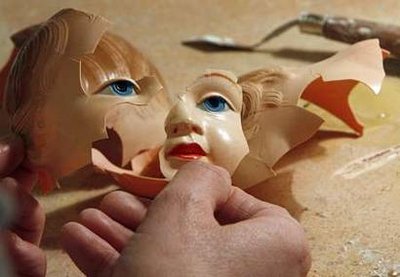Candy, Dolls and Minor Sex Trafficking

Last week one of my volunteers at Bridge to Freedom Foundation (BTFF), Elyse Elder, and I took a different route to our morning as after telling me about a horror film short her boyfriend stumbled upon in is quest for finding yet another thriller to send himself into shock and awe over. Shock and awe was an understatement from what he found when he watched “The Candy Shop,” which he quickly found not to be the fictional horror he is used to, but one based on the reality of minor sex trafficking. Elyse and I settled down with a cup of coffee, fair trade, of course, to see what he was ranting about as these day’s we are rarely shocked at what unfolds in an awareness film. However, as Elyse wrote in her post “Fairy Tales are Battling Child Exploitation” on our blog, this eyeopening awareness short film was nothing like the ones we have seen.
Yesterday I followed-up to Elyse’s post on the BTFF blog with a post, “The Candy Shop and Broken Dolls,” where I gave my own view and highlights on the film. For me, the film was a creative portrayal of an all too real horrors of minor sex trafficking in the United States and abroad. As the film unfolded, it not only addressed the lost innocence of the young victims of minor sex trafficking and exploitation, but also the issue of demand that fuels the growing industry of the flesh trade. The film’s ending is bittersweet. Not only are some of the “lollipops” unable to be turned back into little girls because they are”‘too broken,” but putting an end to the “Candyman’s” business proves not to be enough as demand only finds it’s way into a new location. It reminded me of the endless fight to shut down Korean “massage parlors” — brothels — we have fought so tirelessly in D.C., which would often just re-emerge a few weeks later or move to Northern Virginia.
Following the film, I went rummaging through my old poetry and writings as I vaguely remembered using a similar creative analogy to sex trafficking years ago. After a bit of searching I found what I was looking for — only this time it wasn’t about a “candy shop” but a “doll shop,” although the symbolism and lost innocence are parallel.
Broken Doll
She sits upon the shelf with all the other dolls, smiles painted across their faces, long lashes made to flutter.
Their pretty dresses positioned just right
So beautiful and delicate they look upon the shelf.
Each one quietly waits for their buyer to take them home.
One day the big man comes in, he looks at each little doll searching for the perfect toy to take home
And then he sees her…
He takes her from the shelf, “This one will do.”
Once at home she is no longer placed upon a shelf for one to look at.
She is placed upon the cold bed and positioned every which way the man likes.
Soon the man tires of his doll, and he shares her with all his friends, and she becomes every one’s toy.
Her dress becomes tattered, her body bruised and worn.
But her smile remains firmly painted on her face
Tossed around the bed like a rag doll until she is thrown out with all the other broken dolls.
So many broken dolls…
So many painted smiles hiding needless pain.
Cassandra Clifford (c) 2008
While the film and poem take an artistic approach to opening one’s eyes of the horrors of minor sex trafficking, the real story is even more ghastly, as some 27 million persons are victims of modern slavery — including the sexual exploitation of young girls and boys. In the United states alone, nearly 300,000 are estimated to be at risk for sex trafficking. According to the 2009
National Report on Domestic Minor Sex Trafficking, by Shared Hope International, there are 100,000 children in the U.S. victimized each year.
Even in my web search for an image of broken dolls and candy, or simply candy and dolls, I found myself once again in the reality of this real life horror story as the images plaguing the cyber world for such innocent and seemingly harmless words of childhood lead to the seedy world of childhood exploitation. Little girls dressed like the dolls of my poem delicately placed on on a bed like a toy, others dressed in scandalous costumes and positioned as sexual toys; cartoons of innocent looking girls in promiscuous settings — all for display until someone chooses to buy them to use and play with until they are broken.
